Celebrating International Women's Day with Britain's first Olympic gold medallist on the track, Ann Packer
In 1964 at the Tokyo Olympic Games, Ann Packer made history when she became the first woman to win Olympic gold medal on track for GB, but not in the event she was expected to win; almost six decades later, we reflect on her win to celebrate International Women's Day - and her birthday
By Miriam Walker-Khan
Last Updated: 08/03/23 9:01am

Ann Brightwell, then-Packer, was not supposed to win the 800m at the Tokyo Olympic Games.
Up until the first round of the event at those Games, she had run only a handful of 800m races in her life - locally, and as stamina training for her main event, the 400m.
In the heat and semi for the 400m at the Games, Brightwell had run personal bests and European records. She was a strong favourite, but in the final she was beaten by Australia's Betty Cuthbert.
Cuthbert had won golds in the 100m, 200m and the 4x100m relay at the Melbourne Olympics eight years prior. At the 1960 Rome Olympics, she had an injury and did not make it past the quarter-finals of the 100m and decided to retire from the sport.
But by 1964, she was back, and hungry for a medal in a completely new event - the 400m, which she won.
"I was very disappointed, because I was favourite. I'd run the fastest time in the world that year. But you know, it didn't work out on the day," Brightwell tells Sky Sports.
Cuthbert won in a new Olympic record of 52.0, just 0.2 seconds ahead of Brightwell who had set two of her own Olympic records in the heat and semi-final respectively.
Disappointed with her 400m silver, Brightwell said she did not feel like running the 800m, but her then-fiance Robbie Brightwell, captain of the athletics team, persuaded her to run the heat.
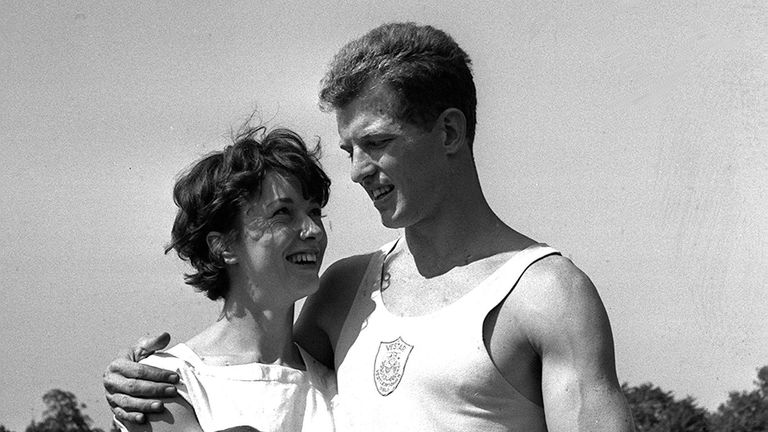
'Nothing to lose'
Brightwell came fifth in her 800m heat in a time of 2.12.6 and just qualified for the semi-final.
"I had nothing to lose, it was just that I was really disappointed. So I was determined that I needed to qualify. I just did what needed to be done," Brightwell said.
In the semi-final, doing what needed to be done meant cutting another six seconds off her personal best.
She was the second-slowest qualifier going into the final. In sixth place at the 400m bell and sitting at the back of the main pack, Brightwell launched into a sprint finish with 150m to go, and by the home straight, continued to pick the other runners off and take the lead.
Brightwell crossed the line in 2.01.1 - a new world record.
The first five runners of the race had all beaten the previous Olympic record.
"I didn't expect it," Brightwell told us. "I didn't even know what the world record was. But I didn't expect to win it!

"I can remember Robbie and the relay team had just finished a semi-final of the 4x400m relay and they were all there. He said to me: 'You don't realise what you've done'. And I don't think I did, really."
Ann had unknowingly started a very exclusive club: only four British women have won Olympic gold in an individual track event. The next person to join Brightwell on that list was Sally Gunnell in 1992, followed by Kelly Holmes in 2004 and Christine Ohuruogu in 2008.
"It isn't until quite a lot later that you realise the enormity of it, because there are some great athletes that never get the gold medal for one reason or another. So yes, it's sobering. And it's a proud moment. But it's more relief than anything," she added.
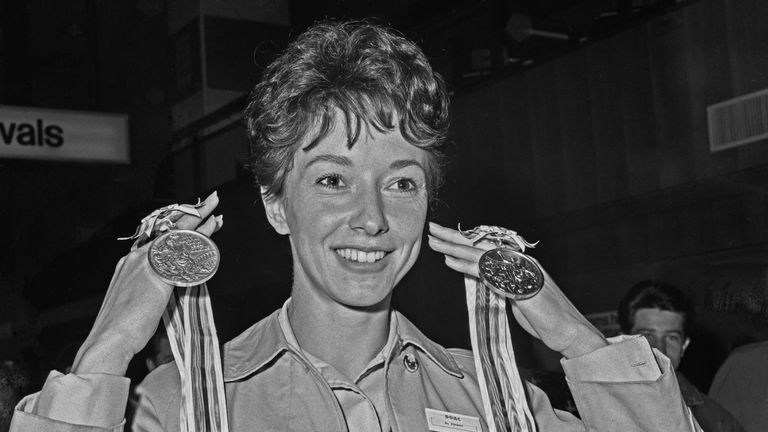
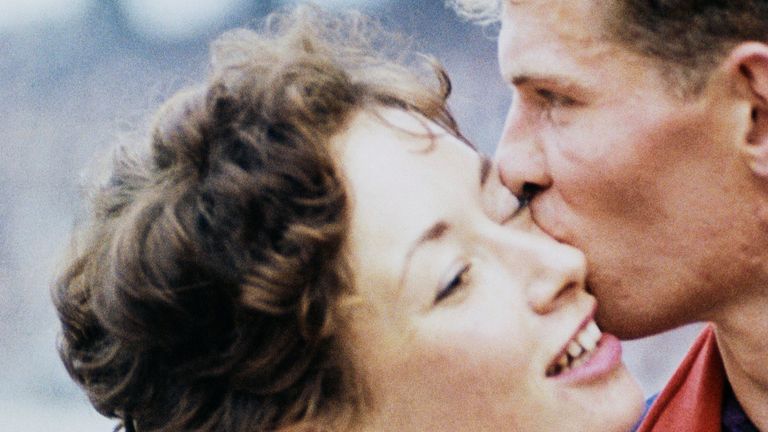
So now, as she turns 81 and celebrates her birthday on International Women's Day, how does she reflect on that moment?
"I just wanted to be an Olympian. It isn't until many years later that you do realise what a big impact it does have on young girls to think, well, if she can do it, I can do it. I was just a kid who happened to be able to run fast," she said.
"It's very important for young people to have role models. And if you're in a position to make yourself into a role model, then it is something to be proud of, and something to pursue."
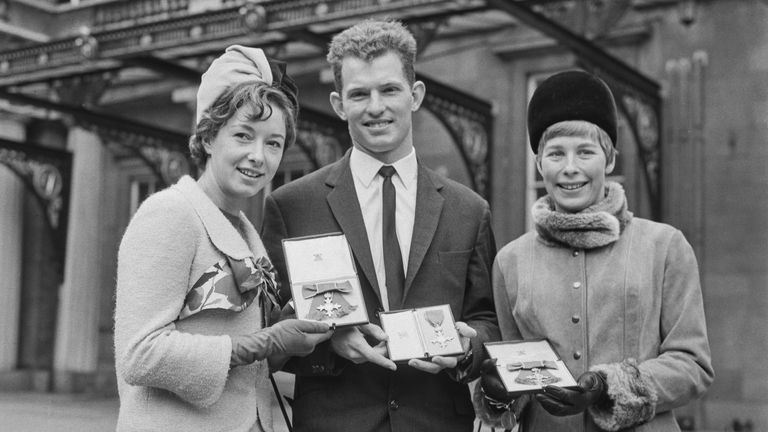
So how different was the world of women's sport in the 1960s?
"It wasn't very inclusive," Brightwell said.
"It was very different because girls tended towards netball or tennis. My two events in Tokyo were the 400m and the 800m. The 400 had never been run in the Olympics before. And the 800 had only been introduced in the previous [Olympics].
"It wasn't quite right to see ladies sweating or being distressed at the end of a race. So there was nothing above 800 metres, whereas now we've got everything apart from the 50km walk - we go right up to the marathon," she said.
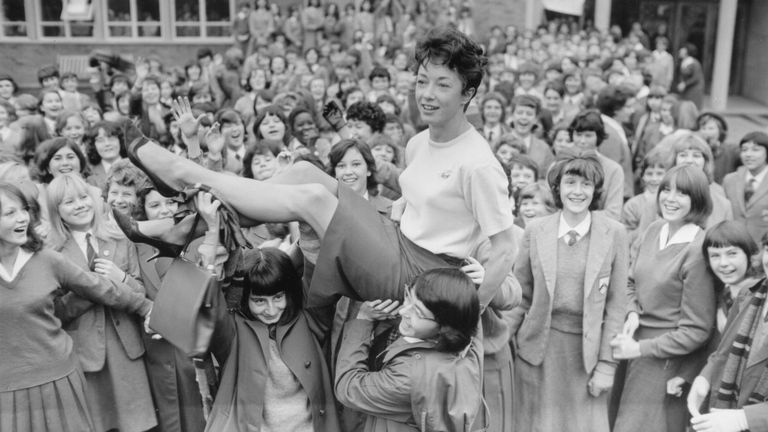
After the Olympics, Brightwell retired at the age of 22, meaning she had one of the shortest athletics careers of any British Olympic champion.
"It was amateur in the strictest sense of the word," she explained. "I had a job. All of us had jobs. It was a question of if you could get time off to compete.
"I was a teacher and I'd only just started at a new school. I had to ask before they gave me the job, if they would let me go to the Olympics, because it's five or six weeks away.
"Some athletes had to give up their jobs. Some had to take unpaid leave, some got sacked.
"And so I did retire early, but it's what we did, because we had to get back to work. Logistically, it was very difficult to train because it wasn't full-time."
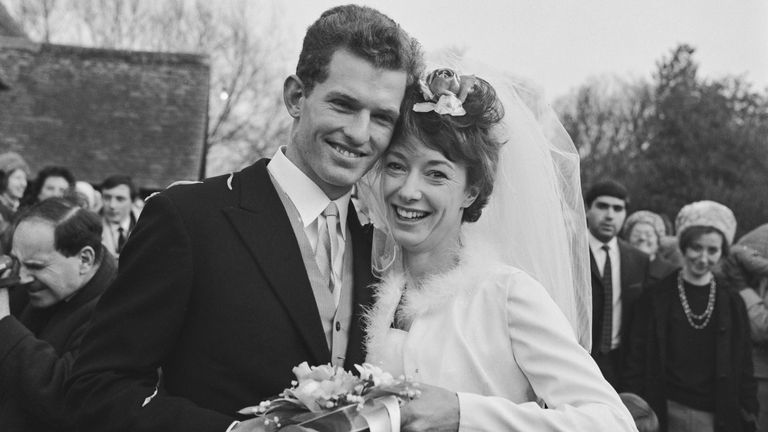
Ann and Robbie went on to marry, and had three sons who would carry on the Brightwell sporting legacy - Gary, Ian and David Brightwell.
Gary followed his mother's footsteps and was a successful 400m runner, while both Ian and David went down the football route.
Ian Brightwell played 468 league games in the Football League and Premier League, in a career spanning 20 years. Over 300 of those games were for Manchester City, where he is now an ambassador.
Speaking to Sky Sports about his mum's success, Ian said: "Not many people have achieved what she's achieved. And I think it gives an inspiration to all females, whether in athletics, or in any walk of life, if you want something, go and grab it, work hard."
David, whose daughter has been inspired by her grandma, also played for Manchester City from 1988-1995, as well as for Bradford City and Carlisle United. He said when they were younger, he and his brothers did not realise how much of a superstar his mum was.
"We didn't know anything else really. And it was a bit like that growing up," David said. The medals came out probably a couple of times a year. But other than that they were in a drawer. It wasn't until the Olympics came round, every four years, people got a little bit more interested in it," he said.
Ian adds: "I think for me, it was school sports days. When you're at primary school, there was the parents race. So we got the trump card. We couldn't quite work out why she kept winning every year. I thought that everyone's parents had won a gold medal, which they haven't!
"But when you get a little bit older, you start to think and look exactly at what they did achieve. It was incredible. And we're very proud."



